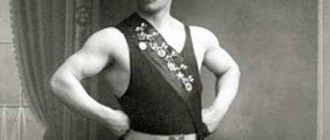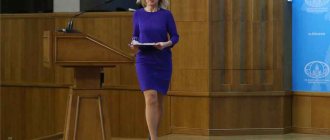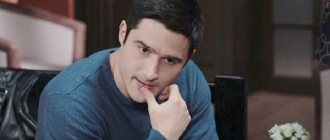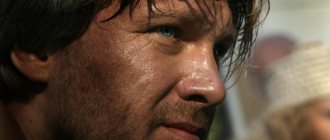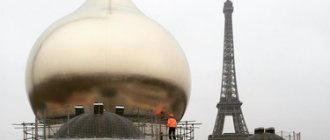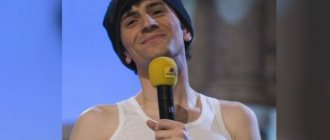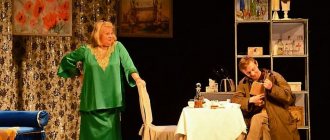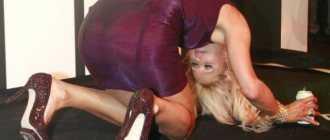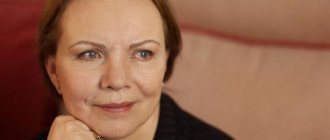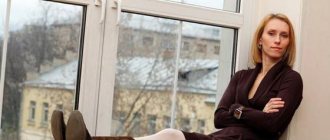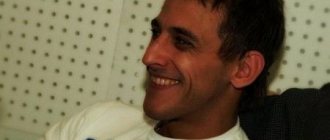Youth
Maria Viskunova was born in Izhevsk, the capital of the Udmurt Republic on May 14, 1989 under the zodiac sign Taurus.
There is little information on the Internet about the early years of the blogger’s life. In one interview, Maria said that her father drank heavily, her parents divorced when the girl was 8 years old, and her mother had a very good sense of humor. It is known that Masha did not do well at school and was also a hooligan. I always got good grades in literature - I read the entire school curriculum. Since childhood, Viskunova was fond of basketball and snowboarding, but an injury prevented her from connecting her life with sports. After school, Maria goes to Yekaterinburg, where she goes to study as a psychologist. Masha never managed to succeed in her profession. She spontaneously decides to enroll in makeup artist courses, for herself and for the future.
Facundo Arana's wife Maria Susini
Maria was born on August 21, 1976 in an ordinary family of Susanna and Hernan Susini. Since childhood, the girl grew up as a creative child, loved to draw and was drawn to animals and nature. The parents decided to develop their daughter’s talent and sent her to an art school. In addition to drawing, Maria soon took up sports; even before she really learned to ski, she was ready to overcome any, even the most difficult, routes. In her adult life, Maria became interested in parachuting, which horrified her loved ones. Years later, the girl decided to try herself in a modeling career and, even despite her not very tall height (only 169 centimeters), she managed to achieve some success in this field. Maria starred in advertising for underwear, and later her candid photographs appeared on the pages of the most popular men's publication Playboy. A smiling, stylish girl with extraordinary energy, in everyday life she dresses simply, but at the same time elegantly, preferring a sporty style and emphasizing the ideal parameters of 90-60-91. Having become a presenter, Maria fell into the soul of numerous Argentine viewers primarily due to her natural charm and sincere smile.
Feathering
Viskunova had to face a lot of competition in the world of makeup artists. However, having overcome all the difficulties, she was able to open her own salon in Yekaterinburg.
Already at the start of her career, Viskunova began recording videos online, these were makeup tips. Users recognized the blogger as #MashkaRastushevka.
The master classes were very popular, including due to the topics raised: “We make up for 500 rubles”, “Culture of wearing eyelashes”, etc.
Popularity on Instagram
Masha talked to TV viewers while she was doing her makeup and she liked it. This is how the Instagram blog was born. “In ordinary life, I constantly chat with myself, and, one might say, subscribers to videos and Stories on Instagram witness this process,” the blogger said in an interview with the Woman.ru portal.
In less than a year, Maria gained 1 million subscribers on Instagram. Viskunova stands out from other Runet bloggers with her bright appearance (she can dye her hair a new color every week), her wit, and, it seems, a complete lack of censorship. In her videos, Masha often raises sensitive social topics. Subscribers appreciate this frankness.
Most often, videos concern the topics of relations between men and women, self-esteem, appearance, and psychological issues. It is not always clear whether Maria is serious or joking.
Husband and children
View gallery
In May 2008, the couple had a beautiful daughter named India, and literally 18 months later, Maria Susini and Facundo Arana became the happy parents of twin sons Yaco and Moro.
The actor and model managed to create a strong and loving family. They were even able to survive together when Maria suffered a miscarriage shortly before she became pregnant with twins. The terrible loss brought the couple even closer together. Maria Susini's husband supported his grief-stricken wife in every possible way, sharing with her the bitterness of loss.
The official marriage of common-law spouses and happy parents of three children took place only in 2012. Facundo himself claimed that he was ready to marry Maria after he first looked into the eyes of a new acquaintance, but decided to wait a few years to make sure of his feelings.
Was there plastic surgery?
Looking at the bright and always different images of Maria, many are interested in whether the girl resorted to the services of plastic surgeons? They are looking for photos by request: Viskunova before and after plastic surgery. From several sources we learn that a popular Instagram blogger underwent breast augmentation - Maria enlarged her breasts from an incomplete second to a size 4. Maria also admitted that she uses Botox once a year. Viskunova did not perform any further manipulations with her face. The defined contour of her face and pronounced cheekbones are the result of well-applied makeup.
Personal life
Despite the fact that in her videos on Instagram, Viskunova has a very rich experience of communicating with the opposite sex, for a long time nothing was known about the personal life of the popular personality. However, in one interview, Maria admitted that she was married twice. And both times, according to her, were successful.
At one time, photos of a happy Viskunova with a man appeared in the blogger’s posts. At the beginning of 2020, Viskunova told the Woman.ru portal that she had met true love. The blogger’s chosen one was musician Levan Avazashvili. However, the couple later broke up.
In 2020, Viskunova entered into a romantic relationship with Artemy Pankratov. The couple's Instagrams are full of happy photos and videos of them together.
Recently, Viskunova’s subscribers learned good news from her - Maria is expecting a child, an ultrasound showed a girl. It is worth noting that with changes in the blogger’s appearance in the form of a rounded tummy, there also came changes in consciousness. The blogger’s aggressive posts gave way to contemplative ones. Let us present one of them in abbreviated form.
“Why 'only positive vibes'? Because “do not increase sorrow.” In the name of a better life, it is necessary to deny yourself this great pleasure - NEGATIVE, writes Viskunova. - Of course, pleasure. Of course, huge. And, of course, the most destructive weakness. I know everything about this pleasure. I myself was still a negative person... The solution is simple - be positive. At least try. Skip the 'negative daytime' in favor of a positive one. Because you get hooked on the positive incredibly easily and irrevocably. It enriches life and immediately bears fruit. Watch yourself, your words, and, attention, thoughts. Rebuild your thinking, change your attitude towards the world.”
Although, where is the guarantee that this is not all the mood of one day or just another banter. You be the judge.
BookshelfCurator of the Jewish Museum Maria Nasimova about her favorite books
I hated reading: I got bad marks in Russian in first and second grade. I always read slowly and hated the whole process until university. Of course, I knew the required list of school literature, but I always overcame it through force. The challenge to read “War and Peace” over the summer did not excite me at all, and no strong impressions followed at that moment: only suffering and no pleasure. Everything changed for me at the university: I must say, I entered the university very early, at the age of 15. All my classmates were two years older than me, and my best friend was four years older, and before that she had studied at the theater school.
As often happens in college, you come into contact with one person and live with him for several years. It was my first university friends who instilled in me the idea that reading is not only important, but also interesting. The first book I read on their advice was Tender is the Night. All my friends are generally terribly romantic, unlike me, and the choice of their favorite books is not accidental. After Fitzgerald, I studied both Salinger and Remarque - all the important works of the 20th century that were given to me at school, I began to perceive on the recommendations of friends.
Non-fiction is my latest discovery, which took place while I was studying at Goldsmiths College. I went to Goldsmiths having already started working: I was a manager at Winzavod. During that period there were many interesting international projects, but there was a severe lack of theoretical basis. There were very specific things I wanted from going to Goldsmiths: I wanted to become a curator with a legitimate degree and a new attitude towards how exhibitions are made. Philosophy at Goldsmiths completely changed my mind: after a year and a half there, I clearly understood that I would never again be able to make exhibitions the way I did them before. Any exhibition began to be accompanied by an insane amount of reading, a special selection of literature on paper and online. Only after forming a thesis based on scientific articles am I ready to begin understanding the exhibition.
When I arrived in London, it became completely clear to me that no one would teach me. They sit you in the library, give you a list of literature and say: “See you in a week.” Then the biggest stress of my life happened regarding my studies, because I practically hated all philosophy, especially Deleuze, Barthes, Merleau-Ponty and everyone else (now these are my best friends).
At Goldsmiths we were most often given an overwhelming reading list with which to prepare for seminars twice a week. We spent most of our time in the library. We were assessed on essays that must contain a certain number of words, footnotes and sources. You need to look for books. A lot depended on the mentor, the tutor: mine was a real French boor who could call me a fool to my face and be surprised that I wasn’t crying. The topic of my master's thesis was love in art and how viewers feel next to works related to this topic. So now I will never forget three months with Merleau-Ponty and Sartre. On the other hand, I learned once and for all to work with text and extract from it what I need in my projects.
My entire professional library is divided between home and work. At home, it's books stacked on the floor, and like anyone with a library set up like that, I'm terrified of moving. How to get a book from below. When I was working on the Lichtenstein exhibition, I bought everything that was written about pop art. Now my library gives the impression that I am crazy about pop art: I have thirty important publications, ordered and brought from everywhere.
There have been cases when exhibitions were formed based on a book read. I was greatly impressed by the book “Summer of a Century,” which explains the intricacies between all the main characters of the first half of the 20th century. I’ve been coming up with this exhibition for a year now and will be coming up with it for another two years, because in addition to the chronicle of 1913, I need to read in detail about a couple of decades before and after that same 1913. My dream is to make an exhibition about the history of the 20th century from the point of view of the characters; in general, I love reading about people and their connections with the outside world.
I really like a very small book published about the collector Costakis, called “My Avant-Garde”. I have a lot of connections with collectors, but not closely: I don’t have such friends whose logic and fanaticism I understand. This book helped me understand what kind of collectors are special people, unlike anyone else. I haven’t announced this to anyone yet, but I would really like to make an exhibition about the nature of a collector, choice and a world in which it is not masterpieces from collections that live, but a reflection of a specific person and what is happening in his head.
I have a world of holiday books. This is Pelevin. I am one of those people who don’t like pop music, and when all my friends and acquaintances do their best to advise reading a certain book, I most likely won’t take it up. Pelevin was praised too much, and this alarmed me, but I read him in one sitting. Another ideal holiday read is Fitzgerald's stories, which can be read anytime and from anywhere.
Now I suffer terribly because I don’t have time to read a lot of fiction. This kind of reading happens in fits and starts before bed or on vacation, which is completely unfair. Like every person, I have an author with whom my relationship is very contradictory. Dostoevsky. I cannot call him not mine, but every meeting with him is a collision, an experience. All I remembered about him at school was that he could write exciting stories. After twenty, of course, I understood him completely differently. I was delighted, wary, frightened, but always came back.
